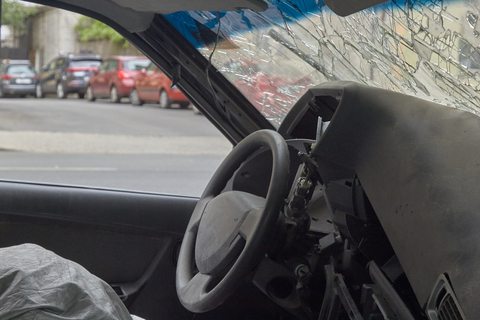It wasn’t part of Sarah Jones’ plan to become a first responder that night while she was driving home in Dunedin. A receptionist at Albany Street Medical Centre, she recalls that she was coming through a blind curve heading to Port Chalmers and having to slow quite quickly because of an accident.
A car crash just happened in a busy road and she remembers the scene quite vividly, “I saw smoke coming out from one car. I also saw a passenger stuck in the passenger side of another car, unable to get out. I remember seeing that the front of the vehicle had been completely pushed in which led me to believe that it was a head on impact. It was an awful picture to see.”
Taking a deep breath, she pulled over to try and help while paramedics were on the way. She assessed the scene and saw an older gentleman needing help. “The gentleman was hanging out of the open car door, stuck under the dashboard and still attached to the clipped seatbelt. I thought just be gentle, try not to move him too much but get him into a comfortable position on the ground.”
The man was in and out of consciousness and making murmuring sounds. Sarah asked for his name, and kept talking to him to keep him awake, and made him as comfortable as possible until the paramedics got there. She shares, “I could pick up that he was asking for his dog which I reassured him he’s okay. Your dog is there.”
“I asked him where he was hurting. He said he couldn’t breathe properly, and it was tight and that his stomach hurt. I just kept reassuring him that help was on the way and that he was going to be okay.”
When the paramedics arrived, Sarah was able to give them a clear and brief update based on what she knew. She managed to answer their questions which the paramedics clearly appreciated.
“The ambulance arrived, and they did their initial scope of the scene. One of them came to me asking questions and I was able to give prompt replies. I told them that this man had difficulty breathing, his abdomen was swollen, complaining of tightness and told them his name. They asked me to stay with him while they assessed the other vehicles and to alert them if anything changed.”
When the paramedics came back, Sarah stepped aside and left them to let them do their work, but the gentleman wasn’t responding to the paramedics. “As I was walking away, I heard them saying his name but no response, so I went back over to him, sat down in the same position I had been in while waiting for help said his name. I said, ‘I’m here, the ambulance is here’. And then his eyes opened and he murmured ‘ok’. It was one of those surreal moments. I waited until the ambulance officers asked questions and if he didn’t respond, I would repeat the questions to him. Maybe I was a familiar voice because I had been there from the start.”
Finally driving home, she thought to herself that this is what she is supposed to be doing – helping others. “This is what I’m comfortable doing. This is what I feel is very rewarding. I just felt like I knew what I was doing. Even though I didn’t have all the skills yet, I felt like I was on the right path.”

Photo 179522989 © Justoomm | Dreamstime.com
Sarah is currently doing an Apprenticeship in Primary Care Practice Assistance with the support of Industry Training Organisation, Careerforce.
“I have learnt so much not just from my training programme, but also at what I actually do in my current job, and that it all just gelled together for me at this accident. Everything that I have read in my apprenticeship, everything that I have researched outside of my apprenticeship, and then everything I’m learning while I do my job, make more sense to me in practice.”
The role of primary care practice assistants is evolving. “The role is no longer just book work and answering calls and making appointments. My workplace is really excited about my apprenticeship. The whole point of me doing the apprenticeship programme, apart from I love the healthcare side of things, is so that I could assist other people in their role – whether that be doctors, nurses, ambulance staff or others.”
Sarah is looking forward to learning more, doing more and achieving her qualification. She is definitely looking forward to being part of the healthcare system for a long time. “I think I just managed to stay calm and do the best that I could. I used what I knew at the time and I know that later in life, as I learn more and get my qualification, I’m going to love using all these to be better in any other incident.”
In 2020 the government recognised the health and wellbeing sector as a priority sector, and the impact of Covid-19 upon employers. In response, it launched the Targeted Training and Apprenticeships Fund (TTAF), and the Apprenticeship Boost Fund.
TTAF removes enrolment fees from most Health & Wellbeing programmes through to December 2022. Apprenticeship Boost provides a wage subsidy to employers of apprentices of $1000/mth for apprentices in their first year, and $500/mth for apprentices in their second year, up to $16,000 for each apprentice they employ.
Contact Careerforce to find out more about the Apprenticeship in Primary Care Practice Assistance designed to upskill receptionists or primary care practice assistants working in medical practices.
careerforce.org.nz/qualifications/apprenticeship-in-primary-care-practice-assistance/

